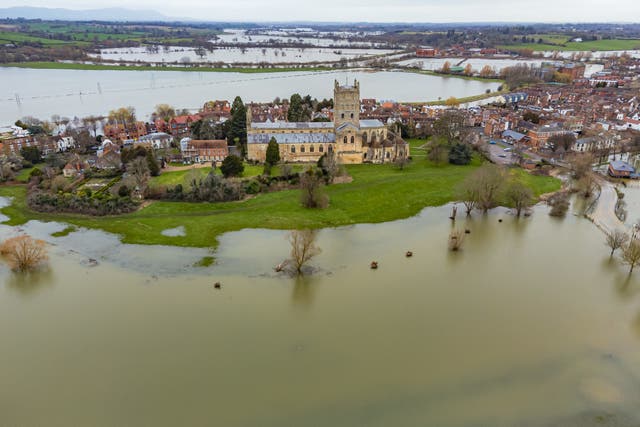The new report from the Intergovernmental Panel on Climate Change also sets out options for – and limits to – adapting to rising temperatures.
28 February 2022
The UN’s new report on climate impacts, vulnerable communities and adapting to rising temperatures spells out the grave and mounting threats the world faces.
Here are some of the main points from the report.
Current and future impacts of human-driven climate change:
I’ve seen many reports, but nothing like the new @IPCC_CH climate report, an atlas of human suffering & damning indictment of failed climate leadership.
I know people everywhere are anxious & angry. I am, too.
It’s time to turn rage into #ClimateAction. https://t.co/ouBcbujyge
— António Guterres (@antonioguterres) February 28, 2022
– There are widespread and pervasive impacts of climate change, including increases in weather extremes, with some irreversible effects as humans and nature are pushed beyond their ability to adapt to rising temperatures.
– People’s physical health has been hit in all parts of the world, with deaths and illness from extreme heat, diseases emerging in new areas, an increase in cholera, and increased exposure to smoke from wildfires.
– Mental health is also being increasingly affected, with people suffering eco-anxiety and trauma from flooded homes and loss of livelihoods.
– In the coming decades, there will be a significant increase in ill health and early death, dengue fever will spread and there will increases in anxiety and stress, particularly in children and young people.
– Global warming has caused irreversible losses in natural systems, with mass die-offs of corals and trees, half of species assessed globally shifting towards the poles or high altitudes and the first extinctions driven by climate change including an Australian rodent the Bramble Cays Melomys.
“Our atmosphere today is on steroids, doped with fossil fuels. This is already leading to stronger, longer and more intense extreme weather events” –@WMO SG Petteri Taalas on today’s release of the #IPCC’s latest #ClimateReport pic.twitter.com/Fs5UwjvV3l
— IPCC (@IPCC_CH) February 28, 2022
– Systems are reaching or approaching “tipping points”, such as the melting of permafrost in the Arctic and the Antarctic ice sheet, while if we hit 2C of warming, the impacts on the Amazon from heat alongside land use change will lead to irreversible loss of its wildlife and natural systems.
– Unavoidable sea level rise will damage coastal habitats, turn groundwater salty, and cause flooding and damage to infrastructure that will hit livelihoods, towns, health, food and water security, with 896 million people living in low lying coastal areas now – rising to one billion by 2050.
– Climate extremes are increasingly driving migration and displacement in all regions of the world, with small island states most affected.
– Around 3.3 to 3.6 billion people live in situations where they are highly vulnerable to climate change. It is not an equal situation with 15 times more people dying from storms and floods in highly vulnerably areas such as Mozambique over the last decade compared to places such as the UK.
– Europe faces coastal and inland flooding, death and illness from heat extremes, damage to natural systems, water scarcity and loss of crop production.
– Impacts and risks are becoming increasingly complex and more difficult to manage.


– The world will see “unavoidable increases” in many climate hazards in the next two decades. Keeping temperature rises to close to 1.5C above pre-industrial levels will substantially reduce the losses and damages caused by climate change compared to higher temperatures, but does not eliminate all dangers.
– The world faces higher risks at lower temperature rises than was thought in the last report nearly eight years ago – with very high risks from extreme weather at 2C of warming, and rapidly increasing risks for coral reefs, nature hotspots and some indigenous people beyond 1.5C.
– The report has a warning about geoengineering, such as “solar radiation modification” which could see aerosols injected into the stratosphere to limit warming, warning it could cause a “widespread range of new risks to people and ecosystems”.
How do we adapt?


– So far, efforts to adapt to a warming world have mostly been fragmented, small-scale, incremental, applied to specific sectors and address short term risks, the report warns, but there are feasible and effective options to reduce the risk to people and nature.
– Measures to adapt range from restoring wetlands and rivers, managing upstream forests and not building in flood plains for flooding, to planting trees in cities to help with urban cooling.
– On farms, water storage, conserving soil moisture and irrigation can benefit crops, although irrigation can cause problems, while nature-friendly farming and agroforestry can support food production and nature.
– Strategies to cope with climate change that reduce food waste or support more plant-based diets can contribute to nutrition, health, wildlife and other environmental benefits.
#Climatechange leads to more extreme weather incl #heatwaves, heavy rain and #floods.Sea level rise increase impacts of 🌀More than 4 in 10 people in the world live in contexts which are highly vulnerable.The poor are most exposed. Everyone is affected.#IPCC #ClimateReport pic.twitter.com/O3AjDBLmgJ
— World Meteorological Organization (@WMO) February 28, 2022
– But the report warns that many natural systems are near the “hard limit” of their ability to adapt, including warm water corals and some coastal wetlands and rainforests, while society faces limits in terms of financial and technical difficulties in adapting.
– And it warns against “maladaptation” where the efforts to adapt to climate change can increase risks, such as hard flood defences or sea walls which could limit space for nature and push the threat of flooding elsewhere.
– Approximately 30% to 50% of the world’s land, freshwater and ocean areas need to be conserved, including current near-natural areas, to maintain the resilience of nature, which is key to helping store carbon and adapt to rising temperatures.
– More financial resources and political commitment is needed to deliver action to help people adapt, and close the gap between the resilience of the most and least at-risk communities.



